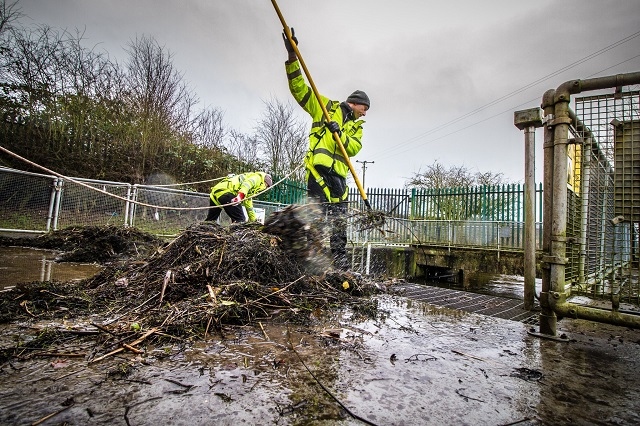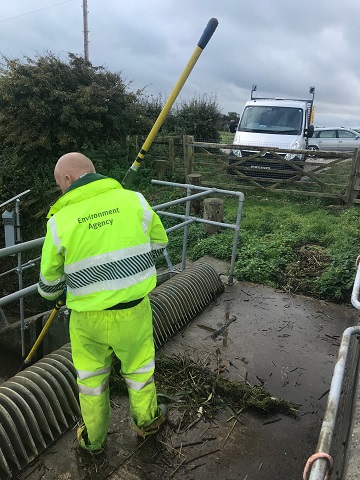A cleaner and greener borough with the Environment Agency
Date published: 20 December 2020

Clean up after Storms Ciara and Dennis (February 2020)
Hello from everyone at the Environment Agency and welcome to our latest round-up exclusively for Rochdale Online.
As we have just a few weeks left before we end what has been one of the most unusual and challenging years many of us have faced in living memory to the archives, let’s take a look back at the environmental highs and lows of 2020.
We hope you enjoy reading. Here’s what we have been up to in Rochdale and the surrounding areas over the last twelve months.
38 debris screens cleared and the risk of flooding reduced
Over the last twelve months, our Operations Team have removed blockages and cleared debris screens throughout the local area. Although this activity falls under general maintenance, it is perhaps some of the most vital work we can do to help reduce flood risk to the community by ensuring the rivers and streams of Rochdale and Bury remain clear.
When it comes to general maintenance where and when we go depends on the location, time of year and rainfall. There are six debris screens within Rochdale with Team EA paying each one a visit at least every fortnight.
Our teams are now full immersed in our ‘Winter Ready’ activities and are regularly checking all of Rochdale’s main rivers and streams to reduce flood risk and protect people. Over the last month, Buckley Brook flood wall has undergone maintenance and the team have completed a debris “walk through” on the River Spodden in the last couple of weeks.
What might surprise you however, is that even on dry days or before flooding is imminent, our teams are still working hard, behind the scenes, to reduce flood risk to homes and businesses across the country. We carry out regular maintenance and repairs, work with other organisations to prepare and advise on flooding matters and constantly monitor river levels and forecasts.

Creating flood defences
No end of year round-up would be complete without an update around Rochdale’s brand new flood defence scheme. Next steps for the £46m project, which will protect up to 1,000 residential properties, 200 local businesses and major infrastructure upon completion, is to submit a business case update report. This means the project team need to get on site and undertake some “enabling works” including creating access routes and site compounds.
If approved, this would allow us to start work on the ground in Littleborough in 2021!
We also continue to finalise the full Rochdale and Littleborough business case and hope to be able to share the final designs with the community next year.

Responding to incidents and protecting our communities
2020 has been a challenging year for our environment. In May, the UK had 266 hours of sunshine, breaking the previous record in June 1957 which saw 265 hours. Just like when we see too much water, too much sunshine puts a great deal of pressure on our environment and our local teams spent much of the spring and summer responding to incidents of fish in distress, parched watercourses and algal blooms.
To add to the strain, the dry spring wasn’t long after the wettest February on record when highest or second highest river levels on record were reached on 13 rivers across England. In part, this was thanks to Storms Ciara and Dennis which swept across the UK over two consecutive weekends bringing heavy rain and gusts of up to 97mph that caused widespread flooding and major disruption on the transport network.
Extremely high and intense rainfall ranging between 40 and 80mm in 24 hours was seen across much of northern England.
213 area staff worked a total of 2,606 hours in our incident room or were mobilised on the ground to operate flood defences and temporary pumps, clear debris from rivers and inspect flood defences to ensure they were ready to respond as needed.
And, while some places did flood, and that is a horrible experience for those affected, we estimate that at least 47,725 properties and businesses across Greater Manchester, Merseyside and Cheshire were successfully protected by flood defences and assets and we were able to warn around 13,500 people well in advance of the storms.
Our changing climate means we constantly need to renew our understanding of the risks we face from our rivers and coastlines and implement ever more innovative methods to keep them at bay.
The government has recently announced a record £5.2 billion investment in flood and coastal defences – double the previous investment – to protect 336,000 properties, and our new FCRM strategy, launched in July, will prepare us for more extreme weather and build a better prepared and more resilient nation.
Natural flood management is also playing a critical part to improve our resilience to flooding and coastal change.
We are working with organisations such as the Woodland Trust and Moors for the Future to create Natural Flood Management (NFM) projects across Greater Manchester at the top of catchments, which will reduce flood risk and enhance the green space on your doorstep.
This includes sites such as Crompton Moor in Oldham where the installation of five leaky damns in October will not only slow the flow of flood water and create habitat for wildlife but will help demonstrate the potential of such schemes for climate mitigation.
NFM works in Rochdale have also had good progress with works in the headwaters of the River Roch complementing the capital scheme works downstream. So far, earth embankment bunds have added an additional 3,600m of storage and created four hectares of habitat. These have helped reduced risk to some of the local communities and are contributing to the bigger picture of downstream flood risk reduction required in the town.

Boosting our biodiversity
The coronavirus pandemic led to an increased appreciation of nature as many of us took advantage of our local green spaces and it’s been a good year for biodiversity. November 2020 saw the completion of a 95k restoration project, designed to improve the natural movement of fish, along some of Greater Manchester’s most industrial watercourses.
The Environment Agency, Groundwork Greater Manchester and Greater Manchester Combined Authority worked together through the Natural Course Project to take out a redundant weir on the River Tonge in Bolton. The removal of barriers like this not only makes it easier for adult fish (mainly brown trout, which are predominant within this section of water) to return to their natural spawning grounds, but it also allows younger fish (smolts) to migrate downstream and get ready to head out to sea once they have matured.
Given the challenges that Greater Manchester’s rivers face - from historical pollution, population growth and increased water demand, this restoration project is a great example of how partnership working can bring vital improvements to our urban watercourses to make them much more resilient to changing environmental conditions.

Getting out on the ground
Throughout this year, our Fisheries Enforcement Officers have also continued to tread the banks of our beloved rivers and stillwaters, undertaking routine rod licence checks and also targeting poaching hotspots where we have received reports via our 0800 807060 hotline number. As you might suspect, our incident response for fisheries is generally seasonal with more of this type of work to deal with during the warmer months.
Unusually for this time of year, we’ve had the full range of incidents to deal with including a number of carp deaths at a commercial fishery, aeration equipment deployed to a club fishery suffering low oxygen levels due to decaying autumn leaves, a massive algal bloom at another club fishery and a large potentially very serious milk spillage which threatened to wipe out a river!
As always, a swift response from our fisheries team in attending all these incidents has ensured the best possible outcome in preventing further fish deaths.

Stay in touch
We hope you have enjoyed reading about some of the challenges your local Environment Agency team have faced this year as well as all of the success stories that come from them.
We look forward to sharing more of our stories with you in February but until then, we would like to say from everyone here at the Environment Agency for Greater Manchester, Merseyside and Cheshire, a safe and very merry Christmas and a happy and positive New Year.
Do you have a story for us?
Let us know by emailing news@rochdaleonline.co.uk
All contact will be treated in confidence.
Most Viewed News Stories
To contact the Rochdale Online news desk, email news@rochdaleonline.co.uk or visit our news submission page.
To get the latest news on your desktop or mobile, follow Rochdale Online on Twitter and Facebook.

